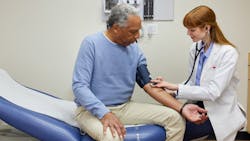CVS Execs Set $10B Healthcare Services Target for 2028
CVS Corp.’s healthcare delivery businesses should grow at a double-digit rate through at least 2028, executives said recently, as they add to the number of patients and health plan members they steer to each other.
Speaking at an investor day where they sketched out Rhode Island-based CVS’ 2024 and medium-term priorities and goals, President and CEO Karen Lynch and other senior leaders said the health care delivery group that comprises MinuteClinic, Oak Street Health and Signify Health is poised to grow revenues to $10 billion by 2028 from about $6 billion today. A key driver of that growth is referring members of the company’s Aetna insurance arm and MinuteClinic visitors to the value-based care clinics Oak Street runs or to home health services from the Signify team.
CVS’ leaders this year paid a combined $17 billion to buy Oak Street and Signify and in September said their near-term focus is far more on integrating them with their other holdings than on acquiring more assets. A big chunk of CVS’ future value to shareholders, interim CFO Tom Cowhey said Dec. 5, is having people engage with multiple parts of the enterprise.
“We have to engage them. We have to help them play an active role in managing their health,” Cowhey said. “We have to surround them with integrated services.”
Cowhey, Mike Pykoscz, CVS’ interim president of health care delivery (and former Oak Street Health CEO) and Signify CEO Kyle Ambrester presented some numbers at their investor day to suggest they are starting to crack the code on that strategy. Among them:
- Immediately after CVS completed the acquisition of Signify, the company launched a pilot program to try to schedule home health evaluations for Aetna insurance plan members that have been hard to reach. The project has been able to connect with about 65 percent of those people, which Armbrester said is “way more than we ever anticipated.”
- An online scheduling portal launched late this summer has generated 10,000 Signify visits that are helping grow referral volumes for mammograms at Oak Health clinics, vaccinations at MinuteClinic sites and other services.
- One out of every six people CVS pharmacy staffers engage with about Signify’s services is scheduling a visit.
- Similarly, about 10 percent of people who have Signify interactions—the venture schedules some 34,000 visits daily around the country—go on to visit an Oak Street location. Armbrester said Signify already is the top referral channel for Oak Street.
Opportunities to add more statistical successes abound, Pykoscz said. Nearly 1 million Aetna plan members live in areas being served by Oak Street Health. Similarly, Signify conducts about 300,000 home visits annually in Oak Street clinics’ catchments.
Turning sizable sections of Aetna members into patients who regularly engage with various parts of CVS’ care delivery network will be key to hitting the $10 billion interim goal Pykoscz and his team have set. The target calls for an annual growth rate of about 12%.
Driving integrated models like CVS’ as well as those at Walgreens Boots Alliance Inc., UnitedHealth Group Inc. and others is the belief that tighter coordination will improve quality and drive down medical cost trends over the long term, said Jon Kaplan, a managing director and senior partner at Boston Consulting Group experienced in value-based care and payment models.
“The models will get more refined; these are long-term plays,” Kaplan said. “People are testing and learning and figuring out what will drive down costs.”
Efforts to manage the cost of care across large populations are today focused primarily on Medicare Advantage plan members, Kaplan said. Over time, the key question will be whether that approach can also generate similar results for populations under Medicaid, commercial and/or individual coverage plans.
Other takeaways from the investor included the launch of the CVS Healthspire brand to be the umbrella of the company’s healthcare delivery units as well as the CVS Caremark pharmacy benefit manager, the company’s specialty pharmacy and Cordavis, a recently launched subsidiary that is working with pharmaceutical manufacturers on biosimilars. Lynch and her team also announced new approach to pharmacy reimbursement pricing, one they say is “built on the cost of the drug, a set markup, and a fee that reflects the care and value of pharmacy services.”
Shares of CVS (Ticker: CVS) closed trading Dec. 15 at $74.43. Over the past six months, they have risen about 7 percent, growing the company’s market capitalization to about $97 billion.


